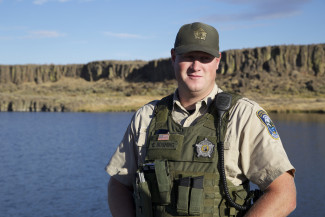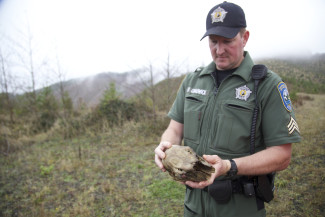‘Rugged Justice’ follows law enforcement in Washington wilderness

Rugged Justice, the new Animal Planet reality series, follows the law-enforcement officials of the Washington Department of Fish & Wildlife as they enforce regulations, avoid the dangers of the wild and stop poachers from spree killing.
Mike Hobbs, deputy chief of the department, said that the producing team behind the reality series actually were going to focus on the unique Karelian bear-dog program; however, the wildlife officials were able to successfully convince the producers that a broader approach would work for Rugged Justice.
“We had never done a show like this, and having never done that, we approached it with some caution,” Hobbs said. “Our contracts office had never done anything like this, so it took us probably, oh, 13-14 months just to get to where we have film crews on the ground. The whole reason for doing the show is we’re looking for ways to highlight our relevance to the greater public. People tend to think of Fish & Wildlife as dealing with hunters and fishermen whereas … we’re relevant to the general public. Anybody that goes outside, hikes, or bikes, bird-watching, any of those activities, we’re the ones that are typically out policing in areas where those things are happening.”
Hobbs said there’s no typical 9-to-5 portion of the job. If a wildlife official makes a plan for one day, it’s usually interrupted by some new case.
“There’s never a day that’s exactly the same as the day before,” he said. “Typically our offices will have some sort of a general plan as to what they want to go and police. Depending on what has happened that day, they could get a call that takes them from their standard eight or nine-hour day … and it could turn into a 15 or 16-hour day. So, yeah, you never know what you’re going to get.”
Law enforcement in general is a dangerous profession, Hobbs said, adding that Rugged Justice is when good law enforcement meets good TV. The officials who makeup Fish & Wildlife generally enjoy the outdoors, but Hobbs said that doesn’t mean they’re hunters and fishers. “Not necessarily what it used to be 20 or 30 years ago where people you saw in this profession … loved to hunt and fish and actually be consumers,” he said. “There’s a lot of non-consumptive use going on these days, and we have a number of our officers who don’t necessarily hunt or fish. They are avid hikers, mountain biking. Yeah, a general love of the outdoors does drive the majority of our force.”

Hobbs has been a deputy chief since November of 2013. The department has 144 commissioned field staff, and Hobbs oversees them with the help of another deputy chief. They both report to the chief.
Now Hobbs can add reality-TV star to his resume.
“I don’t watch a whole lot of TV myself, so I think that what was featured on the show not only does us justice, but it’s also entertaining. I’ve got a number of compliments from around the country on what’s featured on Rugged Justice. So I’m not surprised at what was picked. I think the executive producer and I have had a really close working relationship, and I’ve not been surprised by anything.”
Over the years, Hobbs has seen many cases come his way. From those incidents requiring CPR to the poaching of elk, the vast wilderness of Washington keeps him busy.
Here’s one memorable one: “It seemed like he was a law-abiding citizen. I had a report later on that day that he had poached an elk, and I ended serving a search warrant at his house. I found not only the one elk, but I found a second elk that he had poached as well as some illegal firearms. And we also found that he was a convicted felon, so that person actually ended up in prison over those crimes. So I’ve had a couple cases where they were substantial enough to have the suspect do some prison time. And those days feel pretty good.”
Hobbs said a new trend that he sees is poaching not for food but simply to kill.
“I think what we’re seeing more these days is not only your standard poachers poaching for the meat to put meat on the table,” he said. “Twenty, 30 years ago some of the common things that I’m told were said when we caught a poacher, they were just trying to put meat on the table. They were out of a job, just trying to put meat on the table. I think … that excuse has died off over the years. We’re starting to see, or we have seen, an increase in things like spree killings, basically killing animals just for the fun and leaving the carcass to waste, taking only the horns or the antlers as trophies. So I think spree killings are more of what we combat these days rather than people poaching just to put meat on the table.”
By John Soltes / Publisher / John@HollywoodSoapbox.com
- Rugged Justice airs Sundays at 8 p.m. on Animal Planet. Click here for more information.


You left the marine division totally out of you article. They make up almost half the show. They also collect the most fines. Goeyduck are the most poached of the shellfish along with crab. Puget Sound is the only place Goeyduck grow & they are a delicacy in Asia.
I was hunting in loomis wa over the week of thanksgiving, wondering when the footage you took would air. Thanks,Tim